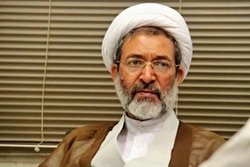 The head of the sociopolitical bureau of the Islamic Seminaries of Iran considered the presentation of the authentic Islam of civilization as the first art of Imam Khomeyni and said, “The first major step that the late Imam took was that between the two secular and dogmatic views was that the authentic civilization-building Islam can be presented.
The head of the sociopolitical bureau of the Islamic Seminaries of Iran considered the presentation of the authentic Islam of civilization as the first art of Imam Khomeyni and said, “The first major step that the late Imam took was that between the two secular and dogmatic views was that the authentic civilization-building Islam can be presented. RNA – In an exclusive interview with Rasa News Agency, Hujjat al-Islam Mohammad-Hasan Zamani, the head of the sociopolitical bureau of the Islamic Seminaries of Iran, explained that the founder of Iran’s Islamic Revolution, Imam Khomeyni, played a role in presenting a new interpretation of Islam and said, “The role that the late Imam played in the Islamic Revolution has been seen in several areas; the first area was in presenting a new, comprehensive and authentic interpretation of Islam. Before him, two interpretations of Islam were common in the world community of Islam and Iran – one, a secular and Westernized version of Islam, and the other, a fundamentalist and intolerant version of Islam.”
Referring to the perspective of secular Islam, His Eminence said, “Secular Islam means that a group of Muslims have concluded that many of the precepts of Islam date back to fourteen centuries ago and to the environment of the Arabian Peninsula and aren’t applicable today and today, Islam can’t become a social system and enforce all the rules. They decided to commit only to the religious affairs of Islam and in the matter of legislation, they borrow the laws of their countries from Western governments that have legislative experience.”
He stated, “This is why before the Islamic Revolution, the constitutions of Iran and other Islamic states were borrowed from Western governments, and they believed that Islamic didn’t have anything to speak about regarding the humanities, including psychology, jurisprudence and the issues of the modern world and these issues should be borrowed from scientists around the world.”
Hujjat al-Islam Zamani cited the Taliban, Wahhabism and al-Qaedah as examples of fundamentalist Islam and said, “The second interpretation of Islam is fundamentalist Islam. In this sense, some believe that the Islamic rules should be implemented and that there should be no trade-offs with today’s academic disciplines, and that the Taliban, Wahhabism, and al-Qaedah can be considered symbols of this trend.”
His Eminence considered the presentation of the authentic Islam of civilization as the first art of Imam Khomeyni and said, “The first major step that the late Imam took was that between the two secular and dogmatic views an authentic civilization-building Islam can be presented. This was the first art of Imam Khomeyni.”
He added, “The Imam said that while all Islamic rules are applicable and by using the element of ijtihad, it can be applied to new issues. We are proud to announce that the Quran and hadiths have the best rules in various fields of psychology, sociology and management, and can compete with the greatest scholars of all Western and Eastern schools, and Islamic teachings are beyond those schools.”
Referring to the design of the model of Wilayat al-Faqih (Guardianship of the Jurisprudent) by the Imam, Hujjat al-Islam Zamani added, “Imam Khomeyni did a very delicate job of designing the software and presenting a model called Wilayat al-Faqih which is why he appointed the Guardian Council not to pass even one law which goes against Islam. Also, with this design, he gave popular sovereignty in all areas, from the election of the Supreme Leader of this system to the president, representatives in the Islamic Consultative Assembly and members of the Assembly of Experts of the Leadership and the Islamic council of the cities etc.”
Rasa News Agency
112/975